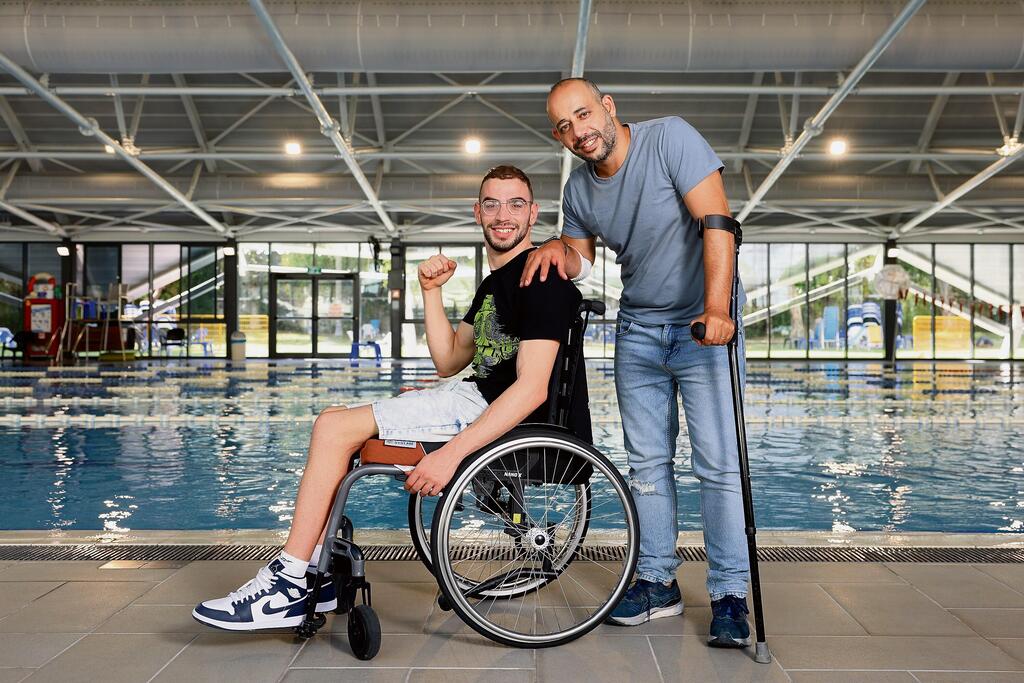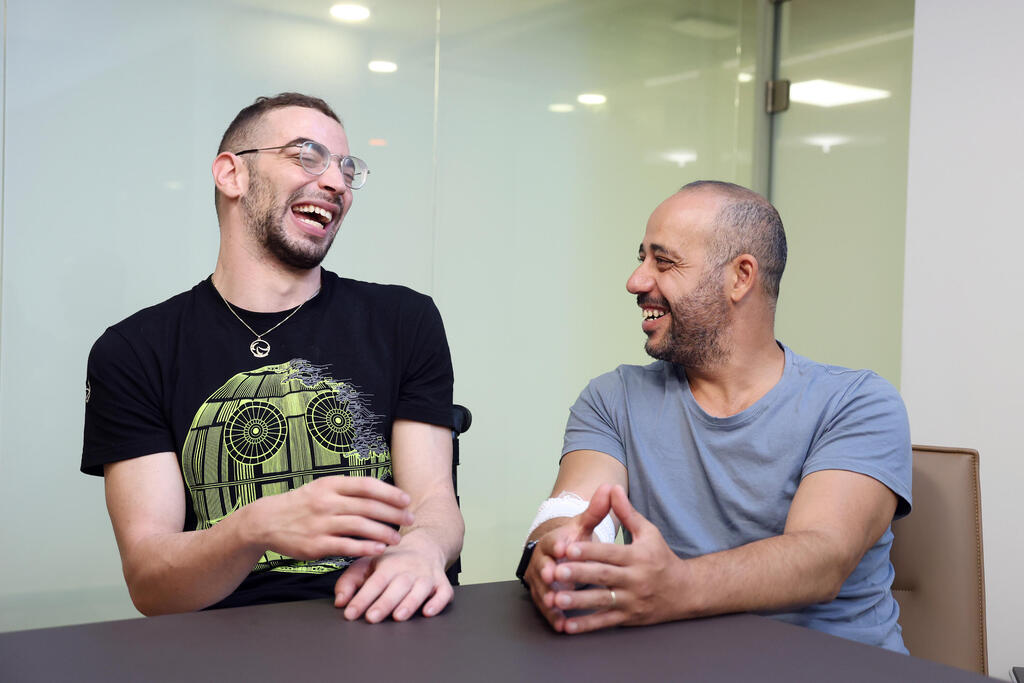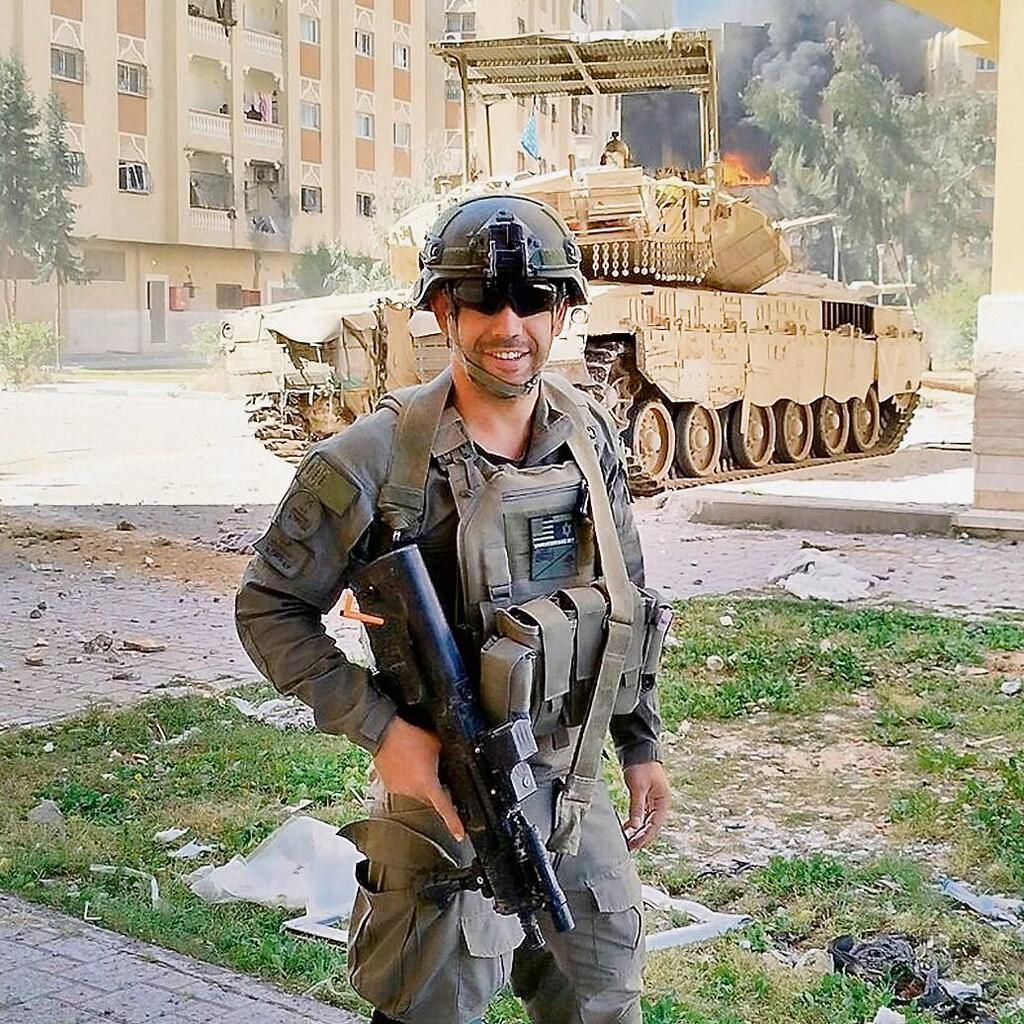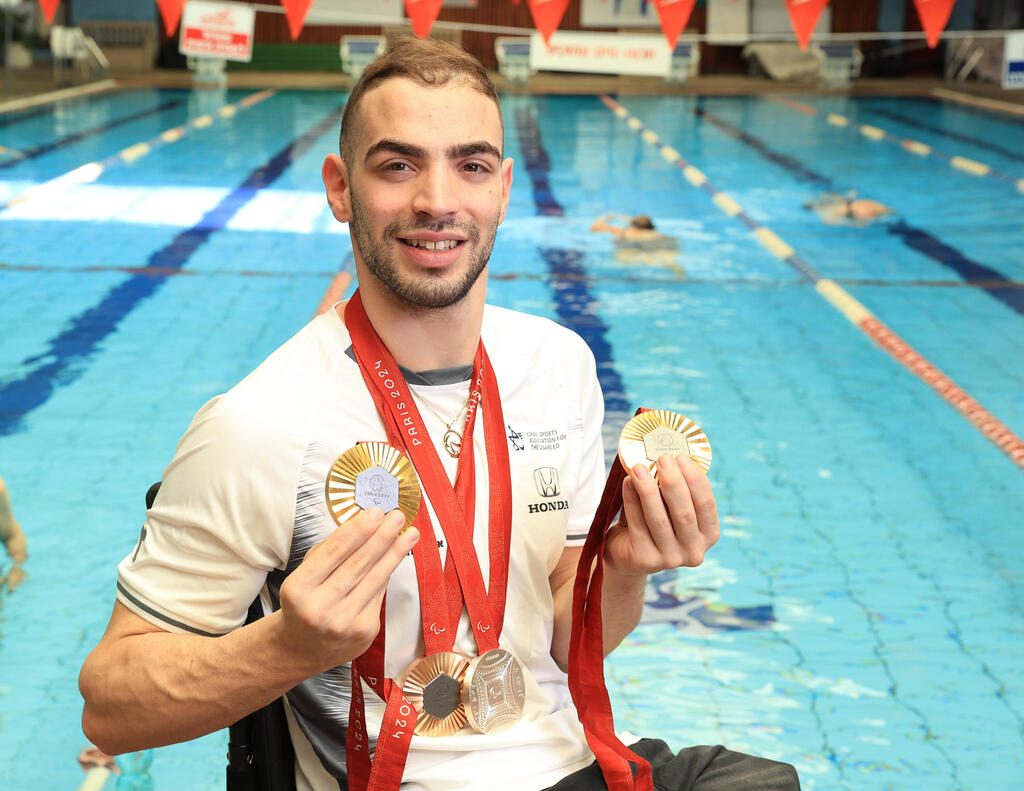Getting your Trinity Audio player ready...
It’s a strange world. Two people who had just met sitting and weeping as if it is clear, without a doubt, that this is the natural thing to do. As if they were accustomed to spending nights together playing on PlayStation while sharing a Pad Thai from the same carton.
One is in a wheelchair, the other on crutches; one is 23 years old from Kiryat Ata, the other is 39 years old from Yeruham; one is a swimmer, Paralympic Olympian at the Paris Games, single; the other is a wounded reserve officer, who works as a fundraiser for a start-up, married with five children.
Two strangers with many differences, yet this was an amazing moment that they shared. Yisrael Ben Shitrit dries his eyes and Ami Dadaon dries his. So does the universe around us, and so do the guardian angels who look after wounded IDF soldiers.
It happens when Ben Shitrit, a company commander in the Alexandroni Brigade who was severely wounded last March in Khan Younis, casually mentions that the door of his home is never closed.
Why, I ask? Ben Shitrit, who is armed with a supply of jokes, who normalizes every trauma with a quip, sighs deeply. Followed by silence. His eyes become red and he lowers them slightly.
You don’t have to, Dadaon says. But Ben Shitrit wants to tell us: that is to say, he must.
It was three weeks after his life was saved. “I wasn’t like now. I was like this,” the combatant whose hand is bandaged because of the shrapnel that was removed from him only yesterday, shrinks; he demonstrates someone who is shattered. Avigayil, his middle daughter, aged ten, was sitting next to him. I want you to know, she said, that I’m really glad that you were wounded.
“I said: ‘How can you say a thing like that?’” Ben Shitrit remembers and then she said a sentence that was hard to hear, ‘On the day that you left, on October 7, I knew you would die, that this was the last time I would see you.’ I asked, ‘Why do you say that?’ She said: ‘Because you are always volunteering, you always jump up. So I knew that was it. When they told us that you had been wounded, I asked ‘But is he alive?’ And when they said, yes, I said ‘Good, Dad has been wounded.’
“Since then, whenever I see the door,” Ben Shitrit’s eyes again redden, beyond them is the vision of the open door of his house in Yeruham, “I think about what would have happened if they had really knocked on the door. What would have happened to them.”
It is not really going to be a discussion about sport, although Ben Shitrit, before his injury, used to run and was not bad as a basketball player; and although world champion Dadaon is here with us. With his four medals containing a piece of the Eiffel Tower. With the millions for them that were carved out of the state budget.
It is going to be a discussion about spirit. And unity. The secret weapon that drives an army. Or a Paralympic team. Or at least the two people who have come here on the initiative of Yedioth Ahronoth for a talk that is beyond nature, as Ami defines it when it ends. For a talk that is a bridge of inspiration over a stormy sea of the sights of war.
Blow a kiss
Someone, a fighter in a wheelchair who is playing basketball, spots Dadaon from afar. A moment before the layup and all that. He stops with a screech and blows a kiss in the air. The kiss, like a cruise missile, splits the sky ceiling above us, crosses clouds, paints the dreams of heroes, and lands on Dadaon.
It happens while we are wandering around in Beit Halochem in Tel Aviv. Among old-time and new wounded soldiers, lightly or severely wounded; among those who have come a long way and others who are only at the beginning of their journey.
Dadaon moves among them; as a symbol of fame, as a person in a state of inspiration. Around him is a tumult. Everyone approaches him; we stop every meter. “You’re a king, buddy,” and “Congratulations” and “Can I have a selfie?” And “You’re a hero,” someone with a dachshund approaches. “You’re heroes,” Ami glows. Dazzling the sun above him.
Immediately, in the hall where the wheelchair basketball training session is taking place, everyone gathers and encircles Dadaon. He moves them with a sentence or two. He doesn’t know how not to be moving. Then he shouts, “Beit Halochem are winners,” and everyone shouts: “Together.”
5 View gallery


An emotional Dadaon sings the national anthem after winning gold at the 2024 Paris Paralympics
(Photo: Sean M. Haffey, GettyImages)
Don’t be confused. Dadaon is a hero not only in Beit Halochem. He will soon tell us about the thousands of comments. In Instagram, in the street, from combatants in Gaza, on the Lebanese border, everywhere. He remembers, for example, laughing, someone who asked him for a kiss on the mouth.
The man in the wheelchair is a symbol, not only of a sporting victory but of a personal and national one. A symbol of shouting Hatikvah on the podium of the Paralympic Games to a world that doesn’t like the look of Israel. A symbol of the victory of the spirit at a time when many people are going around with broken bodies.
The Chairman of Zahal Disabled Veterans Organization Edan Kleiman calls it "Mending the world”. Because in the macho Israeli reality, consolation and inspiration come from someone who was born with cerebral palsy and quadriplegia. “How do people suddenly see things from a different perspective, when the guy in the wheelchair is the champion?” Kleiman says.
What does this say about us? I answer with a question.
“That society is improving. Not thanks to itself, but thanks to Ami. That's why he's a hero. Not because of the medals, that’s just a bonus.”
There were not always fame, esteem and selfies. On the contrary. We now talk about those moments. When Dadaon tells Ben Shitrit about the long journey he has undergone not only on the way to becoming a champion but in order to love himself. These are journeys that usually go together. “Crying at night to God and asking why. Why couldn’t you just give me a normal life and leave me alone?” Dadaon describes his journey.
Dadaon: “As a child you just live it, because that’s what there is. Sometimes people hurt you, they don’t value you. They see a disabled person; they see that you walk clumsily or are in a wheelchair. They made fun of the way I walk, how I speak, how I swim.”
I ask him to go back in time, to the moment when he became aware of who he was, and also to the people who had difficulty accepting him.
“As a child, you just live it, because that’s what there is,” he describes it. “Sometimes people hurt you, they don’t value you. you. They see a disabled person; they see that you walk clumsily or are in a wheelchair. They made fun of the way I walk, how I speak. They made fun of how I swim. All the time you have to prove yourself, for example, that I’m intelligent. Because sometimes people call me autistic, retarded, and I tell them that I have cerebral palsy.
“When I was a boy, adolescence was very painful. You say, ‘Fuck, I want people to value me like everyone else.’ To say ‘Okay, I’m disabled but I love myself as I am,’ is a process that takes a very long time, and you do it as an adult. For me, it was not long ago. You say to yourself, ‘I’m disabled, great, but I have something to give. If anyone doesn’t see it, that’s their problem.’ I received my mission from precisely this process. I realized that I wanted to express my values through sport, and then to find a way to help through it.”
Ben Shitrit listens silently. He will soon tell us how Dadaon’s mission met him.
But now I ask Dadaon what motivates him. Because it is easy to reach the conclusion that, 17 years later, after people laughed at the swimming style of the six-year-old who entered the pool for the first time, he had the last laugh when he became a world champion and received a 100-meter freestyle gold medal, a 200-meter freestyle gold medal, a 150-meter individual medley silver medal and a 50-meter freestyle bronze medal. Achievements that Israeli Olympic swimmers can only dream of.
But no. Dadaon is not concerned with that. Those who laughed at him, he already knows, did so because something in themselves was incomplete. In their self-confidence, or whatever. “I consciously ignored everything they said.
Apart from that, he adds, “They don’t deserve credit for my success. The person who deserves the credit is my coach.”
He received just 30 likes
Yisrael Ben Shitrit reads out loud.
It is a post he wrote before he met Dadaon. After he watched him singing the Israeli anthem, with his hand on his heart and all that. It was a tough day in rehabilitation, Ben Shitrit recalls. “My leg heart like hell. I was in regression. There are days when you're down. And then I saw you,” he says to Dadaon, “and from Paris, you entered my heart in Yeruham, and I said, I’m not going to give up. I owe it to my family, my soldiers, my nation. I am going to lift myself up. There will be other falls, but the ascents will be greater.”
"Thank God," Dadaon replies to him with his hand on his chest. Like back then, with the anthem.
Ben Shitrit’s post goes like this:
“If I were the Minister of Culture and Sport I would insist on a permanent slot for the Paralympic Games every day before the news. If I were the Minister of Education, I would insist on screening the games in the schools.
“In my opinion showing the Paralympic Games, certainly at this difficult time, is the most moving thing that touches upon us.
“It sends so many messages. About self-efficacy, victory and the spirit, the faith that it is possible to do anything despite the challenges. It’s not only a sporting event, it’s a powerful reminder of human strength, persistence and desire to live a full life.
“In my eyes, the Paralympic athletes are a real role model. More than 20,000 wounded soldiers were added just in the recent war. They contend with this every day and hour and win every time.
“This is thanks to champions like you,” Ben Shitrit stops now, points with his left hand, the one that is not bandaged, at Dadaon. Then they embrace. A long hug, straight from the heart, and then the guardian angels of the IDF wounded soldiers again wipe away a tear. Then Ben Shitrit again introduces a twist in the plot.
“The problem is that I only received 30 likes for it,” he says. We laugh. He laughs less.
Dadaon came to the Paris games with a burden. “A burden of ‘I’m going to give these guys some kind of hope,’” he says.
Burden is a heavy word, that drags you down. Each letter in it is a weight. When you are in the water, and you are supposed to swim the fastest in the world, a burden tied to your leg can turn out to be a problem.
“This burden is positive and negative. You have to know to distance yourself from it so that you won’t affect your performance” Dadaon says, and then he remembers his first gold medal, in the 100-meter freestyle contest; the moment when the burden was lifted. “I remember that I raised my head. I saw my face on the screen. I said, that’s it, I’ll give it a moment, and I hope that whoever is now in rehabilitation will see this. I wish...”
Dadaon: “I remember that I raised my head, I saw my face on the screen. I said, ‘That’s it, I’ll give it a moment, and I hope that whoever is now in rehabilitation will see this.”
“On the podium, at the moment when they began to play Hatikvah, I simply began to cry. Everything we had been through. The stories. The people. I said to myself: My mission, my moment, I will do the best I can.
“I cannot really understand your sacrifice,” he turns to Ben Shitrit, “but in my little neck of the woods, I will do the best I can.”
A small detour to Africa
Sometimes Yisrael Ben Shitrit flies to Africa. He gets there in a minute. His aim is not to travel but to escape, and he gets there not by plane but with earphones. Here, he pulls them out of his pocket and shows us. Wi-Fi, white ones.
“I bless the rains down in Africa,” he quietly hums Toto’s song. Their song “Africa” is Ben Shitrit’s escape when the sights and sounds from Gaza attack him. He puts on his earphones, and suddenly “It’s as if I’m in the savanna.”
Soon he tells Dadaon about some of the traumas that come back to him, that he can no longer listen to the sentence “Take your shirt off” after he undressed wounded soldiers so many times in Gaza, and about the soldier who was hit by shrapnel in his heart and Ben Shitrit used his fist to stop the blood.
When Ben Shitrit speaks about all these, Dadaon and he sit almost next to one another. Some 15 centimeters separate them, although we are in a spacious conference room.
Anyway, Ben Shitrit's story returns slowly back to October 7. After the video of the truck in Sderot, he took a car, drove between the synagogues in Yeruham, and continued to Yeruham Lake, urging whoever he met to hurry home, and asked whoever had a gun to join him. From there he went with a friend to the main entrance to the city. “We blocked it with two cars. We checked whoever came in or out.”
At the same time, he asked his family at home to pack him a bag for six weeks, and he recruited his fighters. In retrospect, we know that he needed to pack for longer.
Ben Shitrit and his fighters first went to the north for four and a half months, and then to Gaza, first to the Qatari neighborhood. Spectacular villas, all containing ammunition. Ben Shitrit remembers dozens of encounters with terrorists, and especially evacuation of wounded soldiers.
There was one incident there that it was impossible to forget. Anti-tank fire into the lobby of a magnificent house in the neighborhood. One person was killed, others wounded. They were waiting to be evacuated by helicopter and while taking care of one of them, Ben Shitrit asked him what basketball team he supported.
Boston, the wounded soldier replied. “We made mincemeat of you in 2022, Steph Curry, Game 4,” Ben Shitrit, a Golden State supporter, boasted. The event developed into a competition over basketball until the helicopter arrived and the wounded soldier had to go. After all, there were one or two things he had to deal with.
“I said to him, ‘I’ll see you, man, we’ll continue the argument,’” Ben Shitrit says.
They took up the argument after Ben Shitrit was wounded and was flown to Soroka Hospital. He underwent surgery and then there was a performance by the singer Akiva at the hospital.
“I looked to my left. Suddenly I saw the soldier who was wounded. Beginning to cry. He began to cry. Akiva was crying. The entire audience was crying.”
Ben Shitrit was wounded on March 31 in Khan Younis. He demonstrates the incident using two bottles of soda water that are lying on the table. Each bottle represents an armored personnel carrier. Not far from them are a road, a tower, and soldiers.
Ben Shitrit: “It was like in a cartoon. I flew to the left from the blast, I felt that I had received a very strong blow on my entire right side. I don’t know how I’m alive.
The task of Ben Shitrit and his combatants was to locate terrorists who had fired an anti-tank missile the day before. They began with a briefing in one of the houses, gathered together for a photo, although Ben Shitrit had made sure he did not have his photo taken previously. Then, when he was outside, between the soda water bottles, i.e. the APCs, and facing the one on the right hand side, which he was supposed to command, an RPG missile was on its way to meet him.
“Like in cartoons,” Ben Shitrit says “and I said to myself, this is my last moment. I flew to the left from the blast. I felt a very strong blow on my entire right side. I don’t know how I’m alive. I was exposed, then I moved towards the two APCs, and there I lost consciousness. After a few seconds, someone touched me, ‘Wake up, why are you sleeping now?’ I look to the right, to the left, maybe it was God or an angel, I don’t know. While it was happening, I heard the shouting of the wounded. I have been in many incidents, but the shouts here were different, worse.
“I saw a house on the left, crawled to it, tried to get out the tourniquet, to bandage myself. A unit of ours was there. Running towards me with guns. One of them aimed right into my face. Apparently, I was covered in soot. I had to say something so they would identify me, so I shouted: ‘Noa Kirel didn’t win the Eurovision contest!’”
The room filled with laughter. You need special talent to introduce humor at the height of the drama. We were tense, as if we were with him, sooty, with a gun in his face, in a house in Khan Younis. “For a moment I believed you,” Dadaon says.
“I shouted ‘Alexandroni Brigade,’” Ben Shitrit continues, this time without mentioning Noa Kirel. “One of the soldiers said to me ‘You’re bleeding all over.’ I told him that now they needed to evacuate the wounded soldiers who were outside.”
Dadaon is astounded. “You see,” he says, “Only the people of Israel have this.”
In the next few minutes, Ben Shitrit described how he ran outside. How he grabbed the legs of the wounded soldier and tried to pull him. How he called other people because he couldn't manage. “As soon as we brought him into the house, he died in my arms.”
Then he went on to describe his own evacuation. It did not happen so fast; Ben Shitrit refused to get into the first helicopter evacuating the wounded soldiers. Only afterward, when they bandaged him, his vital signs plummeted, and he heard someone call out “Helicopter, urgent.”
Ben Shitrit: “You know what is hardest in rehabilitation? One day I finished a lap of the pool and I saw on my phone an emergency mobilization order. My company was called up and I wasn’t part of it. That’s when it hits you”
Chest, stomach, legs, lots of shrapnel. Also, there was bleeding in his head that was discovered later. The sight in his left eye was damaged, he had cognition problems. And pain and coping. Three and a half months in the rehabilitation unit in Soroka Hospital and never-ending nights of Spotify because he couldn’t sleep; and shrapnel that could not be removed, and crutches.
“You know what is hardest in rehabilitation?” Ben Shitrit now asks Dadaon.
Dependence on other people, Dadaon suggests. He's wrong. “One day I ended rehabilitation in the pool,” Ben Shitrit says, “and my phone received an emergency mobilization order. My company was called up and I wasn’t part of it. That’s when it hits you.
“I can tell you,” Ben Shitrit continues, “that in Gaza there is no right wing or left wing. It’s not the same as in Israel. You put on uniform and everyone’s friends, my buddy. An amazing spirit. That's what you brought with you. When we are united, we can win even with spears and sticks.
“I would never desert my soldiers. They are my real brothers, you understand? They are more important than anything else. And that’s what the public’s representatives should feel.”
“They should feel they have a mission,” Dadaon sums up, “like I felt in Paris and like you and all the reserve soldiers feel. Our leaders should realize that they are working for us. Not the other way around. They must remove their suits and meet the people at eye level.”
Ben Shitrit: “We deserve it. We are an amazing nation.”
Either 100 or zero
We enter the pool area.
It’s an Olympic-size pool, 50 meters long. With a timekeeper and everything. The ripples of single swimmers can be heard in the background. There is a strong smell of chlorine in the air, of the kind that settles on your nose and is not going anywhere. “That’s the job, like someone who works in a gas station,” Dadaon evades the question when I ask him if he likes the smell.
Earlier Ben Shitrit asked Dadaon if he wants to jump into the water with him, just as he is, with his clothes on and everything. Dadaon replied in the negative. He also evaded the offer of a swim in a swimsuit. So that it seems to me, in a quick analysis, that the champion doesn’t feel like swimming anymore. He’s had enough.
“Am I fed up with swimming? Yes, I’m tired,” Dadaon says, “I’ve had three very difficult years. The training sessions in the pool, in the gym. Also growing as a person is not a simple process. It’s very tiring.”
Perhaps you have done your bit and you feel that it’s time to move on, I suggest. “It depends how I feel after a rest. I don’t know how to do 50 percent. I know either 100 percent or zero. But I live the water, I don’t know anything else.”
“You can’t retire,” Ben Shitrit is alarmed, “You have to go on. You have a mission. You touch people’s hearts.”
Meanwhile, until he makes a decision on the topic, Dadaon is planning a break. A holiday, Cyprus, that sort of thing.
“Cyprus,” Ben Shitrit is alarmed. “Do you realize who you are?”
In the pool or outside it, with medals or without, there are people whose job is to touch hearts. People who were created for it. Dadaon is one such person, and now he is determined to cause the innumerable war wounded around him to believe. Maybe he will give lectures, maybe he’ll find another way. But he delivers the message: if he overcame an entire world in the water, others can too.
Soon, in any case, after they record a joint video, they will have to deal with Ben Shitrit’s 30 likes, they say as they say goodbye. One of them returns to Kiryat Ata, the other to Yeruham. 400 kilometers separate them. Two fighters. One in a swimsuit, the other in uniform.
Get the Ynetnews app on your smartphone:
First published: 18:19, 11.17.24






